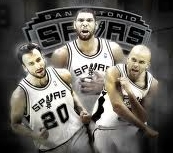 |
| Heat Big Three, Celtics Big Three |
 |
| Spurs Big Three |
For football, there are some great blogs out there that analyse all kinds of aspects of the game - headed goals, woodwork strikes, etc. including, rather perfectly timed, this piece from the excellent soccermetrics.com - which mentions:
I'm not writing this post to demonstrate how awesome my little algorithm is, but rather to demonstrate that predicting league performance, whether by on-field event data or off-field financial data, is very difficult and captures very little of the variance present in actual league performances.
As a gambler, it's important to be able to separate the useful data from the interesting data. Is team data more important than individual data? For a sport such as basketball, clearly the individual player data is of greater importance than in an eleven player sport such as football. The loss of LeBron James for example will impact the odds on a Miami Heat win far more than the loss of even a missing Messi would be for Barcelona. Most top NBA teams have a so-called 'big three', and the loss of one or more of these can turn a 1.5 shot into a 3.0 shot, as we have seen this season with the San Antonio Spurs. One reason why rating NBA teams purely on team statistics is fraught with problems. As for baseball - the same teams play against each other on two, three or four consecutive days, and the prices fluctuate wildly, all because of one key player - the pitcher. To be meaningful, team ratings need to allow for the stats for this one individual. Unfortunately, starting pitchers rarely pitch the whole game, so how much does the starter's numbers count for? Perhaps not so much as you might think, and perhaps a reason why opposing short priced favourites in baseball is a better option than trying to buy money.
Peter Nordsted has certainly had some success with this strategy this season, and I believe last season too (at least until the late part of the season when favourites, often 'needing' to win, seem to do just that a little more regularly), and he also offers one good reason for betting based on ratings, even if he does end his sentence with a preposition:
That's the beauty of following a value ratings based system. It takes all of the emotion out of making the decision of what to bet on.I remember clearly my Mother overhearing me tell someone to "Fuck off" when I was a young boy. She was furious. "Don't you ever let me catch you using that expression again", she shouted. "Using language like that is not appropriate. 'Off, is the direction in which I would like you to fuck' is much better English" - a lesson I have not forgotten.


I think you're probably underestimating the skills of the very best sports gamblers / modelers. This sort of data would be invaluable to them. Obviously not all of it, but they'd love the chance to find out.
ReplyDeleteIn terms of in-running, you'e right, probably not that useful in the current markets. But mainly for liquidity reasons.
A guy called Haralabos Voulgaris is an interesting character in the NBA betting world.
http://articles.businessinsider.com/2011-04-28/sports/30044313_1_gambling-bug-haralobos-voulgaris-basketball-expertise
(In first paragraph last sentence i.e. to find out what is useful and what isn't - by having access to it)
ReplyDeleteCassini,
ReplyDeleteI have now started blogging again at http://tradeonsports.blogspot.co.uk and I have began by mentioning a post you put up in September 2009 that really changed my approach to betting especially on the US Sports.
I would be very grateful if you could put a link to the blog on your blog.
Keep up the good work
Pete